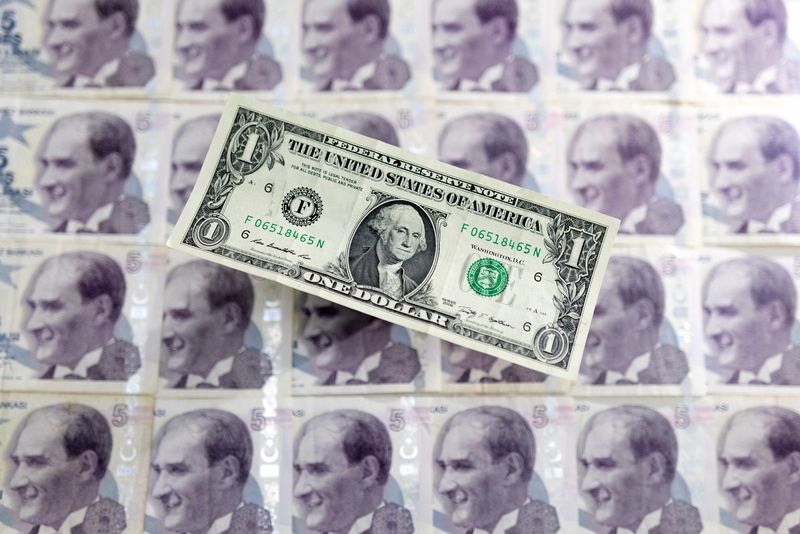By Ebru Tuncay and Can Sezer
ISTANBUL (Reuters) - Turkish depositors mostly converted funds back to dollars last month when they withdrew from state depreciation-protected accounts, according to initial data and senior bankers, as Ankara begins winding down the scheme in a broad policy U-turn.
Since President Tayyip Erdogan won re-election in May, authorities have raised interest rates sharply under the U-turn and set a goal of reducing the near $130 billion-worth of lira currently held at the accounts, known as KKM.
The central bank protects deposits from depreciation under KKM, adopted in late 2021 to arrest a historic currency crash.
But since then, the lira has shed another 50% of its value - including 25% since this year's election - ramping up the scheme's costs and testing confidence in the currency just as authorities are seeking to reinforce it.
Two of the senior bankers told Reuters that since the election, the central bank has continued to sell forex to lenders in order to meet the demand of those closing down KKM accounts.
According to one of the bankers, 20% of the KKM accounts that were initially converted to lira from foreign currency were ended in August. Of those, around two thirds were converted back to forex while the rest moved into regular lira accounts, according to three bankers.
One former KKM depositor who declined to be identified said they closed their account as it no longer appeared worthwhile.
"I didn't earn anything after some time and then it felt scary to remain in KKM, so I got all my money out and went back to dollars," the person said.
CONFIDENCE
The central bank is spearheading the pivot to more orthodox policies after a series of lira crashes and soaring inflation. It wants to reduce KKM volume to sharpen the effectiveness of its monetary transmission mechanism.
The volume of these accounts decreased by 1.1%, or 40 billion lira, to 3.37 trillion lira in the week to Aug. 25, the first drop in lira terms in eight months, BDDK regulator data shows.
In dollar terms, KKM account volume is at a record $127.6 billion, or 26% of total deposits.
The bankers told Reuters some lenders were paying an annual interest rate of up to 45% to those who converted their funds held in KKM to lira deposits, with the rate on deposits of up to three months rising around 10 points in the last week.
But they said depositors were cautious about moving funds into lira deposit accounts just yet given expectations that deposit rates will rise more. More will shift into plain lira accounts - rather than dollars - as that happens, they added.
In the week ending Aug. 25, foreign currency deposits of domestic residents and companies increased by $4.78 billion, according to official data.
The central bank's net international reserves have risen sharply from negative levels in early June. But that trend halted in August at a peak of more than $15.7 billion as more KKM accounts were shuttered.

In the last three weeks, the central bank's net FX reserves have dropped $1.4 billion to $14.3 billion.
Separately, according to first-half balance sheet data from some banks and economists' calculations, three quarters of the $127.6 billion held in the KKM system had been initially converted from foreign currency rather than from lira.